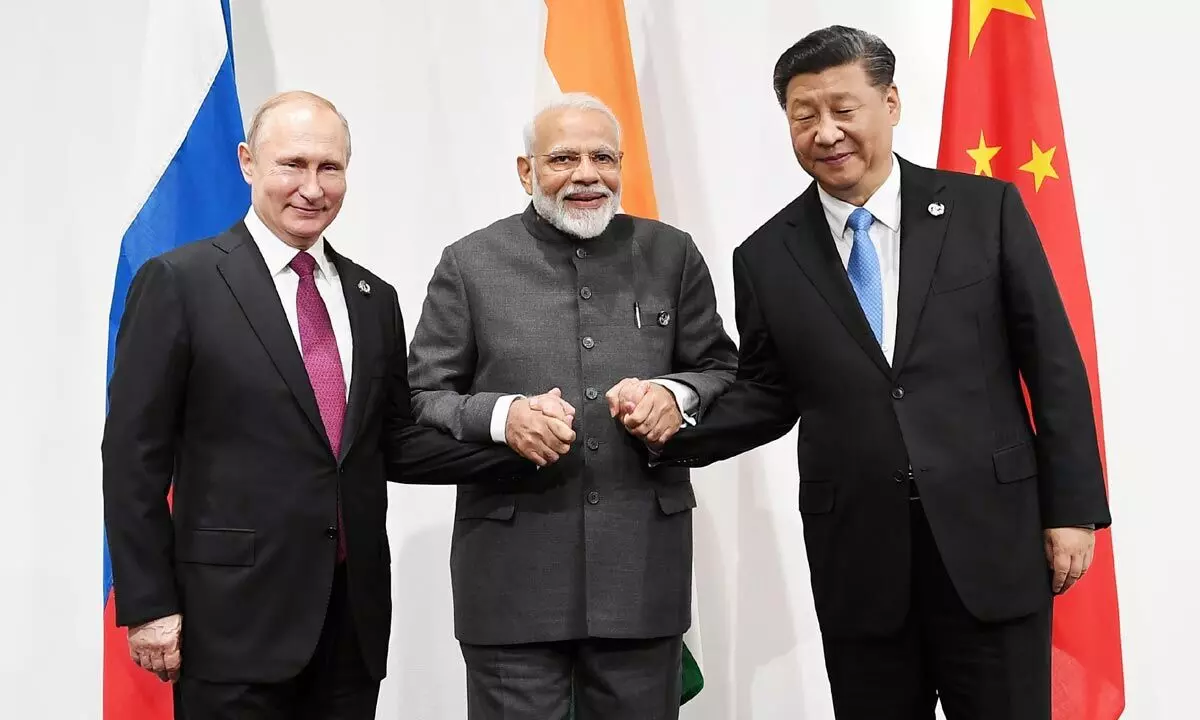India in tug of war with China for Russian support
A neutralised Russia will be detrimental to Indian interests
image for illustrative purpose

It is against this backdrop that China and India have navigated their relations with Russia after its 2022 invasion of Ukraine. On the surface, China and India seemed to have pursued similar policies towards Russia and the West
Russia's economy is becoming increasingly dependent on China, especially in the last few months, and it could soon be a vassal state of Beijing, opine many experts. The two economies are becoming more intertwined in trade and finance as Russia becomes further isolated. However, it is not an equal partnership as China is calling the shots.
That assessment comes from French President Emmanuel Macron, and even sources close to Kremlin, have said that Russia is destined to become a Chinese resource colony. While Russian officials dispute that characterization, experts say it has merit.
"To me, Russia is not [a vassal] yet with China, but it's clearly headed there," said Jay Zagorsky, a markets professor at Boston University, pointing to Russia's growing reliance on China as a trade partner. Russia has predicted that trade volume with China will notch a new record of $200 billion this year, while other statistics show that Russia will export around 26% of its goods to China, Zagorsky said. That's double the amount before the Ukraine war, when Russia exported only 13% of its goods.
And though Russia has become a resource hub for China, it doesn't necessarily make Russia a client state.
The relationship has benefited both sides, but especially China, which has ramped up its purchases of Russian goods at steep discounts, particularly crude, natural gas, coal, and precious metals. Meanwhile, it's sending huge amounts of manufactured goods to Russia, which has the dual benefit of boosting China's GDP and adding high-value jobs to its economy. Russia, meanwhile, has been using the partnership to stay afloat as it deals with sanctions and tries to keep funding its war in Ukraine. The difficulties it is facing make it only more likely that Russia will deepen its dependence on China.
It is against this backdrop that China and India have navigated their relations with Russia after its 2022 invasion of Ukraine. On the surface, China and India seemed to have pursued similar policies towards Russia and the west. Both have refrained from condemning Russia, continued to trade with it, and distanced themselves from the West’s robust response. But China went a step further. It allowed its state-owned companies to sell Russia dual-use technology, including semiconductors that could be used in military hardware. Indeed, China doubled its exports of semiconductors to Russia during 2022. That no doubt was appreciated in Moscow.
India has taken a somewhat different tack toward Russia. It sharply boosted its purchases of Russian commodities, from fertilizer to steel. Most notably, India went from being a negligible importer of Russian oil in 2021 to being the biggest in 2022. India’s buying spree did not go unnoticed in Moscow (or the West). In fact, Indian leaders bristled at Western criticism of it. While doing so it irked the United States. Indian leaders probably judged that Washington would look past India’s imports, considering America’s need for Indian participation in the Quadrilateral Security Dialogue.
Both China and India have pursued their relations with Russia in ways that serve their broader national interests. Ultimately, China wants to prevent Ukraine (and by extension the west) from decisively defeating Russia, in large part because Beijing would like an ally that is sufficiently strong to be helpful in its own competition against the United States. Meanwhile, India would like a Russia that is strong enough to act independently of China and can help prevent it from becoming Asia’s dominant power.
Even a nominally neutral Russia would be detrimental to Indian interests. For example, were Russia to embargo arms and spare parts to both sides, such an action would penalize India far more than it would China.
Moreover, even without a war, China’s closer bilateral relations with Russia could encourage Beijing to pursue its interests more forcefully in South Asia, whether on its disputed Himalayan border or with India’s surrounding neighbours. That too could tilt the power balance between China and India and lead to greater regional tensions. While India has sought to deal with such a possibility through warmer relations with Australia, Japan, and the United States, among others, New Delhi’s embrace of the west has been very slow, likely the product of India’s traditional mistrust of it. But given how close the Russian-Ukrainian war has brought China and Russia, New Delhi might want to pick up the pace.

